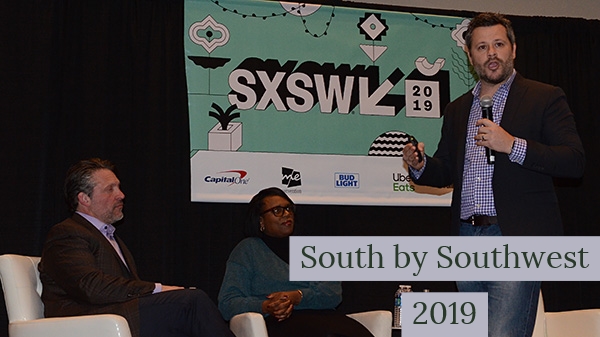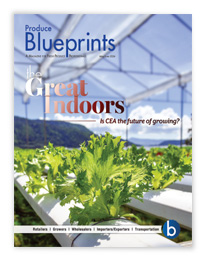Adam Cooper, Senior Vice President of Marketing for The Wonderful Co. talks about the company’s successes in building a brand through emotional connection to consumers at SXSW in Austin, TX.
AUSTIN, TX—It’s no secret that fresh produce checks all the boxes for health and wellness, but the problem is people’s food decisions – for the most part – aren’t rational.
During a discussion hosted by the Produce Marketing Association at South by Southwest on March 12, panelists explored the emotional drivers of fresh produce consumption.
“If fresh fruits and vegetables are so good, and we all know that they should be half the plate, then why has fresh produce consumption in the last decade stayed constant?” asked Lisa Cork, a New Zealand-based fresh produce marketing consultant. “We know it’s good, but yet we’re not eating more of it.”
Stephen Springfield, executive vice president and chief marketing officer of Sentient Decision Science, reviewed research conducted for PMA that explores the subconscious, experiential drivers of food choices.
Fresh produce can’t market on health alone, Springfield said.
“We should take a more open tact to how we want to market foods,” he said. “This is not a rational game. It’s an emotional reason to buy wrapped in a rational envelope. It doesn’t matter whether you’re selling beer or Cheetos or carrots or broccoli. The goal is to amplify the right mental associations.”
And sometimes that means expanding your “sandbox,” so to speak, said Adam Cooper, senior vice president of marketing for The Wonderful Company.
Cooper outlined some of the strategies taken by Wonderful in positioning its Wonderful Pistachios and Wonderful Halos against other snacks outside of the produce department.
For Halos, it started with making parents feel good for choosing Halos with clever advertising that also connects to a robust in-store display program that encourages retail partners to push their boundaries beyond produce.
“What better way to inspire healthy choices than to put healthy, sweet Halos right at checkout next to sugar, candy and all that other crap,” Cooper said. “We really think we’re inspiring healthier choices.”
Over the past two years, Cooper said, Wonderful has installed 30,000 of the company’s in-store displays across North America.
“We want these displays in the lobby, in the checkout area,” he said. “We got these displays in the pharmacy for the first time ever.”
The efforts have pushed Wonderful Halos to become America’s No. 1 healthy food brand, and one of parent’s top 10 loved brands of any kind in a field that includes Crayola, Netflix and Google.
“We’re really proud of this accomplishment,” Cooper said. “We feel like we’re just getting started, but what worries me is half of this list is some of that bad stuff that leads to less healthy choices.”
“This is the challenge for Wonderful, this is the challenge for the produce industry…to keep reimagining the sandbox,” he said. “We tapped these macro trends, we really focused on all these primal desires. That helped Wonderful disrupt the produce industry.”
AUSTIN, TX—It’s no secret that fresh produce checks all the boxes for health and wellness, but the problem is people’s food decisions – for the most part – aren’t rational.
During a discussion hosted by the Produce Marketing Association at South by Southwest on March 12, panelists explored the emotional drivers of fresh produce consumption.
“If fresh fruits and vegetables are so good, and we all know that they should be half the plate, then why has fresh produce consumption in the last decade stayed constant?” asked Lisa Cork, a New Zealand-based fresh produce marketing consultant. “We know it’s good, but yet we’re not eating more of it.”
Stephen Springfield, executive vice president and chief marketing officer of Sentient Decision Science, reviewed research conducted for PMA that explores the subconscious, experiential drivers of food choices.
Fresh produce can’t market on health alone, Springfield said.
“We should take a more open tact to how we want to market foods,” he said. “This is not a rational game. It’s an emotional reason to buy wrapped in a rational envelope. It doesn’t matter whether you’re selling beer or Cheetos or carrots or broccoli. The goal is to amplify the right mental associations.”
And sometimes that means expanding your “sandbox,” so to speak, said Adam Cooper, senior vice president of marketing for The Wonderful Company.
Cooper outlined some of the strategies taken by Wonderful in positioning its Wonderful Pistachios and Wonderful Halos against other snacks outside of the produce department.
For Halos, it started with making parents feel good for choosing Halos with clever advertising that also connects to a robust in-store display program that encourages retail partners to push their boundaries beyond produce.
“What better way to inspire healthy choices than to put healthy, sweet Halos right at checkout next to sugar, candy and all that other crap,” Cooper said. “We really think we’re inspiring healthier choices.”
Over the past two years, Cooper said, Wonderful has installed 30,000 of the company’s in-store displays across North America.
“We want these displays in the lobby, in the checkout area,” he said. “We got these displays in the pharmacy for the first time ever.”
The efforts have pushed Wonderful Halos to become America’s No. 1 healthy food brand, and one of parent’s top 10 loved brands of any kind in a field that includes Crayola, Netflix and Google.
“We’re really proud of this accomplishment,” Cooper said. “We feel like we’re just getting started, but what worries me is half of this list is some of that bad stuff that leads to less healthy choices.”
“This is the challenge for Wonderful, this is the challenge for the produce industry…to keep reimagining the sandbox,” he said. “We tapped these macro trends, we really focused on all these primal desires. That helped Wonderful disrupt the produce industry.”



